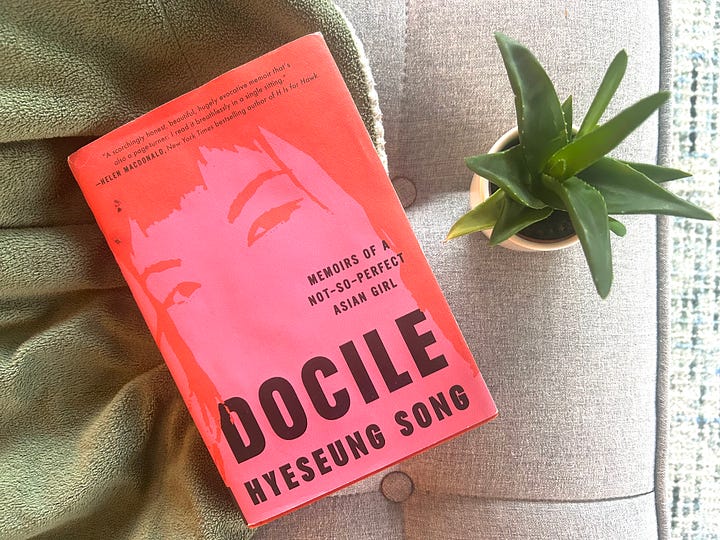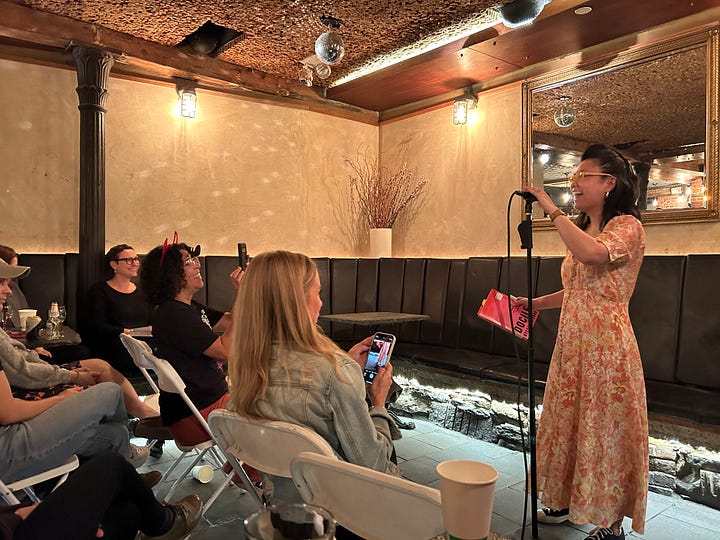Immigrant Strong: December 2024
On grief and beauty, becoming an immigrant, and books by Indian diaspora
I’m glad I made it to my former hometown of Toronto earlier this month to read parts of my essay Sea Creatures at the launch of Back Where I Came From: On Culture, Identity, and Home—check out some pictures on my Instagram page.
Speaking of back where I came from: my friend Kristin Vuković, whose debut novel The Cheesemaker’s Daughter was featured in this newsletter, is organizing an inaugural writing conference in Croatia in May—check it out and apply soon, as the January deadline is fast approaching!
I hope everyone is having a relaxing holiday, and that 2025 will bring you peace and love. I didn’t come close to meeting my writing or reading goals for the year :( but I’m focusing on the positives. In 2024, I attended my first in-person writing conference—at Martha’s Vineyard Institute of Creative Writing. Shortly after, I attended the Kenyon Review Writing Workshop, and I started the year with the Tin House online workshop. I loved each and every one of these experiences, mostly because I met so many incredibly generous and talented writers. I’m still in touch with many of them and am looking forward to more reunions in 2025.
This year, I had two essays come out in two anthologies—the Connecticut Literary Anthology 2024 and Back Where I Came From. A third essay was read on stage as part of the Your Faithful Reader production (the show will run again Jan 30-Feb.2!) And I kept this newsletter going for free for another year, so thanks to everyone who subscribed and shared it, and supported immigrant writers.
It feels strange to share personal news amidst the chaos that is the world today—and well-founded fears that things will get worse starting in January—but I know to celebrate things worth celebrating, so I’m excited to share I’m headed to Hedgebrook next month for their Writer in Residence program. This one is pretty close to a dream come true for me, so for those of you who are writing and applying to things—I hope you keep at it. I never thought I had much of a shot of getting into this one, so it’s always worth trying. I don’t claim to be any kind of an expert on these applications, but if anyone reading this has a specific question about applying to these conferences and residencies, feel free to reach out and I’ll answer if I can be of help.
I hope you are finding time and energy to read and write, or do whatever fulfills you. If you are setting New Year’s goals and resolutions, I hope you are productive and successful, but above all, I hope you are kind and gentle with yourself. Thank you for reading—and here is to a healthy and happy 2025 filled with creativity and community.
Vesna
Book


I heard Hyeseung Song read from her memoir Docile: Memoirs of a Not-So-Perfect Asian Girl at the Sunday Salon in New York, and decided to read the debut book afterwards. The daughter of Korean immigrants writes about trying to live up to her mother’s unreasonable expectations, mental health struggles, and finding joy through art as part of her healing journey. This coming-of-age memoir examines the pressures often put on first-generation Americans, tackles the model minority myth, and shows us the powerful role that art can play in life.
Essays, Interviews, and Lists
Thanks to my friend Ivona for letting me know about this piece—anyone who knows me will immediately know why this piece resonated in sooo many ways… Here is Jelena Markovic’s A grief with no name for Aeon.
“But I don’t think betweenness is where the grief comes from. Rather, it comes from how the experience of migration, particularly as a child, forces you to confront the contingent nature of identity much sooner than others do. Sooner than anyone should have to, really. I felt under distinct pressure to create, curate and choose what I would take from each world I was exposed to (itself a distinctly Western mode of identity-formation). My self-identity was so contested, and so much seemed to ride on the decisions I made. It’s as if I were standing on a connecting train platform, unsure of where to go.”
This is a heartbreaking piece that’s worth your time—Susan Abulhawa Remembers Refaat Alareer: Poet, Teacher, Husband, Father for LitHub.
“Over the years, Refaat and I had several discussions about his embrace of English literature instead of Arabic. Having been forced to leave my Arabic education at a young age, I would lament to him that it pained me to have never developed a sophisticated grasp of my poetically charged mother tongue. He agreed, mostly. But he found English more practical and pliable. More importantly, he wanted to master the language of the empire that oppressed him. Always thinking of Palestinian liberation, Refaat believed there was great value in speaking and writing to the people of empire to lay bare our humanity before them.”
For Electric Literature, Anita Felicelli shares 13 Books by Indian Diaspora Authors You Should be Reading.
“For the last few years, I’ve been secretly gathering my list of diasporic authors I’d like to invite to a massive dosa fusion dinner party with bird’s eye chili drinks. I don’t know, really, if they’d all get along, but hey, a little friction could be a fun thing (and makes it more likely we’d all want to write about it)! The following books strike me for their imagination, observations, and inventive spirit—and often, their moving risks. Whoever says it’s all been done clearly hasn’t encountered these works.”
I enjoyed this interview in the Rumpus, A Productive Tension Between Grief and Beauty: A Conversation with Emily Jungmin Yoon.
“Once I moved here, I felt an impulse to rethink the way I describe things. I think a lot about a place of un-belonging that I [occupy] here as a settler, as someone who didn’t grow up in Hawai’i, someone who doesn’t know the historical context. I am learning. I might look at a beautiful bird I love and find out that they are an invasive species, or the trees that I love might be invasive as well or brought here for the curation of tourists’ pleasure. So I felt this urgency to know more but also found that I am so inadequate. Trying to write from that unsettled knowledge has been a productive struggle for me.”
I’ll end with this important piece by Ademola Adefolami for the Adroit Journal on Becoming an Immigrant.
“Like Baldwin, I also believed that the place in which I’ll fit will not exist until I make it. In a sense, some of us have to make “home” as we move along in life. Considering that I would also be traveling far away from home and living in a new country and new culture for two years, gave me the impetus to consider the meaning of home anew.”
Thanks for reading—and wishing you a happy and healthy holiday,
Vesna
About this newsletter: Writing about immigrant and refugee life—the struggles, triumphs, and quirks—by immigrants and refugees, and children of immigrants and refugees. For more info, here is a Q&A I did with Longreads about the newsletter. Photo in the logo: Miguel Bruna/Unsplash.
About me: I grew up in the former Yugoslavia, then immigrated to Canada, and now live in the United States, where I work as a writer and communications consultant for nonprofits in the human rights and international affairs fields. I have written for Back Where I Came From: On Culture, Identity, and Home, Connecticut Literary Anthology 2024, Connecticut Literary Anthology 2023, The New York Times, Pigeon Pages, the Washington Post, the New York Daily News, and Catapult, among others. I participated in Tin House and Kenyon Review Writers’ Workshops, and won the Poet & Author and Parent Writer fellowships from Martha’s Vineyard Institute of Creative Writing. Find me on Instagram and Bluesky.



